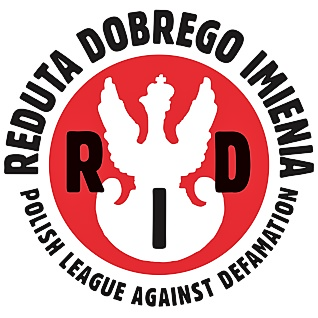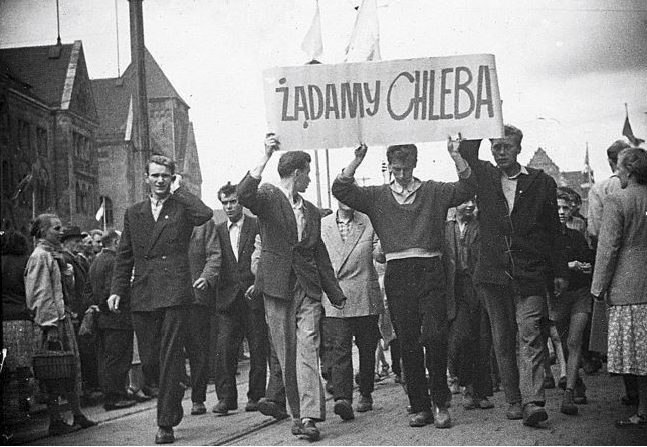Poznan June 1956 was the first mass workers’ demonstration in the history of the People’s Republic of Poland. It should be emphasised that the authorities of that time used the forces of the People’s Army, soldiers of the Internal Security Corps and officers of the Security Office and the Civic Militia against the strikers.
As a result of the brutal suppression of the demonstrations, 50 civilians were killed and at least 523 protesters were injured. Full responsibility for the deaths of these people lies with the direct perpetrators, as well as those in power who authorised the use of weapons. Members of the communist regime’s apparatus of power have never been punished for the Poznan massacre, which is one piece of evidence of the crimes committed by the communist regime against the Polish people.
In June 1956 (and also before and after it, until the overthrow of the communist regime), Poland was subordinated to the USSR, deprived of sovereignty and the possibility of self-determination, and the communist dictatorship restricted every sphere of Polish life and activity. In addition, the economic situation in the country resulted in pervasive poverty and the majority of the population living in poverty.
Despite these dramatic circumstances, the Poznan workers dared to speak out against the authorities and take to the streets. The slogan „Bread and Freedom”, which was found, among other things, on the walls of the PZPR headquarters in Poznan, went down in history, becoming an expression of the people’s anger and aspiration for a decent life. The protest of the Poznan workers was a response and a manifestation of general dissatisfaction with the situation in the country.
On 28 June 1956, workers at the J. Stalin Works in Poznan (formerly Cegielski Works) went on general strike. The crew demanded, among other things, the return of improperly calculated bonus taxes, a reduction in excessively high production standards and an improvement in health and safety conditions. Among the workers’ demands were also demands for wage increases and price reductions.
At 6:30 a.m. the factory sirens gave the signal for the protest to begin. The workers left the factory premises and marched to the headquarters of the Municipal National Council and the Provincial Committee of the Polish United Workers’ Party (PZPR) – a communist party subordinate to Soviet rule. The protesters were joined on the march by workers from other Poznan factories. During the demonstration, they sang, among others, the national anthem, the „Rota” and religious songs, including „God, Thou who Poland”, with the words „Homeland free deign us return, Lord”. There were also white and red banners and banners with slogans such as „We demand wage increases”, „We want bread”, „Down with the communists”, „We are hungry”, „We want freedom”, „We want a Catholic Poland, not a Bolshevik Poland”.
Some demonstrators made their way to the buildings of the Municipal National Council and the Provincial Committee of the PZPR. Red banners were torn down and protest slogans were displayed, and portraits and busts of Soviet and Polish apparatchiks were destroyed. Among the protesters, false information spread that the authorities had arrested a delegation of workers who were negotiating in Warsaw on their behalf. This news caused a huge commotion, with the result that some demonstrators rushed towards the Mill Street prison. More than 250 prisoners were released from the prison and the protesters also captured weapons. Other demonstrators forced their way into the neighbouring building of the District Court and prosecutor’s office, throwing court and prosecutor’s documents into the street, where they were burned.
OPPOSITION TO COMMUNIST TYRANNY
On 28 June 1956, the first shots were fired from the windows of the Provincial Public Security Office building, starting an exchange of fire with demonstrators. According to witnesses, women and children were also shot from the UBP building.
During the clashes, the workers used bottles of petrol and weapons captured from the prison and Civic Militia stations. The fighting became increasingly fierce, covering the entire city. The communists of the Political Bureau of the Central Committee of the Polish United Workers’ Party (PZPR) decided to send the army – the People’s Polish Army (LWP) – to quell the uprising in Poznań. Command of the action was entrusted to the Deputy Minister of National Defence, General Stanislaw Poplawski, a Russian disguised as a Pole. A party and government delegation from Warsaw, consisting of Józef Cyrankiewicz, Wiktor Kłosiewicz and Jerzy Morawski – high representatives of the communist regime – was also sent to Poznan.
At around 2 p.m., on 28 June 1956, General Poplawski gave the order to introduce the army into Poznan. About two hours later, the 19th Armoured Division of the Silesian Military District entered the city centre. In the evening, it was joined by units of the Sudeten 10th Armoured Division and the 4th and 5th Infantry Divisions. The city was occupied by more than 10,000 troops, 359 tanks, 31 armoured guns and nearly 900 cars and motorbikes. In addition to the army, officers of the Security Office, the Civic Militia and soldiers of the Internal Security Corps (KBW) took part in the bloody pacification of the city.
On 29 June 1956, Prime Minister Józef Cyrankiewicz made a memorable radio address to the demonstrators in which he issued a direct threat regarding the way in which the communist regime intended to deal with the strikers: „Every provocateur or madman who dares to raise his hand against the people’s power should be sure that the people’s power will chop it off”.
On the morning of 30 June 1956, the final battles came to an end.
The brutal suppression of the demonstrations had dramatic consequences. At least 501 civilians were killed on the streets of Poznań, including 13 people under the age of 18, and probably at least 523 were injured. Mass arrests also began on 28 June, resulting in a minimum of 7462 people being detained. All those who were suspected by the apparatus of power of involvement in the struggle were detained and subjected to torture during interrogation. Security Office and Civic Militia officers mercilessly mistreated the detainees. In this way, the authorities of the People’s Republic of Poland were taking revenge for the workers’ demonstration, sending an unequivocal signal to society that all attempts at resistance to the authorities would be suppressed with all means of coercion including the use of armed force.
The drama of June 56′ in Poznań had serious consequences for the PRL authorities. The anger of the people and the first workers’ uprising against the regime significantly accelerated the political and economic changes in the People’s Republic of Poland. June 56′ became a milestone for subsequent anti-communist movements that took place in the following decades of the PRL. It could even be said to have been an anti-communist revolt in which workers refuted the lying thesis that the Polish United Workers’ Party represented the working class. When the widespread anti-communist uprising, led by the Wyklętych /Niezlomny Soldiers, died out, it was the Polish workers who took up the struggle for a free homeland, which ultimately led to the creation of Solidarity and the fall of the regime. It is important to remember this, especially as the truth about the efforts of Polish workers in the struggle for Poland’s freedom is currently being distorted by various socialist half-truths.
Honour the heroes of June 1956!

